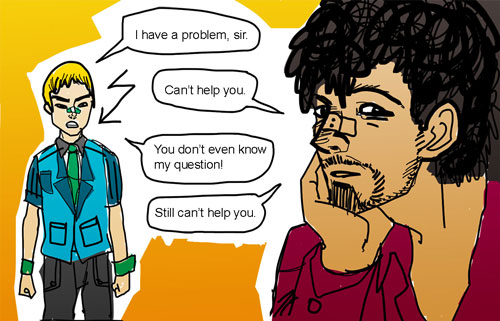
By Mars Dorian, {grow} Contributing Columnist
I did something crazy.
I took my life offline (gasp!) and took a family trip to the East Sea of Germany.
In case you don’t remember, more than 20 years ago, the East part of Germany was under Soviet rule, which meant communism infiltrated every level of the local infrastructure. Which meant no competition, and thus no need to innovate or provide customer service. Because, hey, if you chose not to patronize the business, you were screwed! There was no alternative. Even after 20 years of German Unification and capitalism, a lot of businesses are still stuck in the Soviet era. This became obvious when I and my family settled down in a family-owned resort close to the coast. The holiday was about to begin, just like the business nightmare.
Below, I’m sharing three major customer lessons I’ve unfortunately learned from my trip to the East shores. Let this be a warning of what NOT to do in your online business!
1. Complications Are Opportunities
We approached a family-run bicycle rental service and wanted to rent bikes. My cousin’s six-year-old girl was with us, and as we all know, dealing with little kids requires a little sensitivity. Sounded like a no-brainer, considering the bike shop was family-operated, but oh boy, was I wrong. My cousin’s little daughter tried a bunch of bikes, fell over, hit the trunk of a nearby tree and started crying. After that, we tried bikes with training wheels and lower seating. The business owner started to get agitated.
“You guys are driving me crazy. Can’t you just pick one bike and be happy with it?”
Yep, there’s that world-famous East German customer service. In the end, we ditched the kid’s bike and opted for an adult bike with a booster seat for the little one.
We also decided to never return to this bike rental service ever again.
Lesson: There are, and always will be, challenges with different customers and their individual needs. This is an opportunity, not a punishment.? As long as the demands are within reasonable limits, you should make an effort to make the business transaction as smooth as possible. Freaking out, or becoming disgruntled, by the slightest complication is a sure-fire way to lose your customer. Forever.
2. Lower Your Defenses, Feedback Is Your Friend
We were only an hour into the bike trip on the coast, and my chain had come off, while my mother had hit a bystander because her brakes didn’t work properly. We exchanged gloomy looks and considered whether we should cancel the trip. Thankfully, another rider came to our aid and inspected our bikes, free of charge.
The man said, “Your chains need oiling, and the brakes need a make-over. Frankly, your bikes are in terrible condition.”? Later in the evening, we returned the bikes to the family business and shared our experience.
The owner simply said,? “No one’s forcing you to rent from us.”
True story.
Lesson: You are responsible for the maintenance of your online business. If a customer complains about your site’s navigation or laments about your confusing e-commerce plugin, don’t go into defense mode like the owner of the bike shop; that’s for babies.
Boohoo.
Instead, be thankful! Chances are, there were other customers who had the same problems but didn’t bother to speak up. Rectify your problems and thus ensure future customers will have a smooth experience dealing with your site.
3. You Can Help, Even If You Can’t.
Two days before I wanted to leave the holiday resort, I had to print out my online ticket for the bus. The family running the resort had both a computer with online access and a printer. There was just one “insane” problem–the printer wasn’t set up. It wasn’t connected to the PC, probably needed some drivers installed, and lacked paper. Frankly a matter of a couple of minutes, but the owner just didn’t care.
He simply said, “I don’t know how printers work.”
When I asked his adult son an hour later, he claimed the printer was broken, and I gave up. Two days later, when I packed my rucksack and headed for the bus stop, I passed an open door and saw the printer magically working! Turned out, their family was visiting, which gave the son enough incentive to look for someone who could “fix” the printer problem.
If only he had done the same for his customers!
Lesson: If you can’t solve your customer’s problem, find someone who can. Sometimes people ask me for things I can’t provide, like website coding or corporate logo design. Instead of saying, “I don’t know,” I recommend them people I know and trust, or link to resources that can help them out. Just because you don’t have the solution to a problem doesn’t mean you’re finished helping.
Conclusion
The East holiday resort I visited was in Rügen, a northern island of Germany, close to Scandinavia. The place has one of the highest unemployment rates in Germany, and maybe the omnipresent lack of customer service is a part of that. I loved the beaches, the fish sandwiches, and the coastline. But I’m surely not naming nor recommending the family business we had to deal with.
What lessons have you learned from real-world customer disasters?



